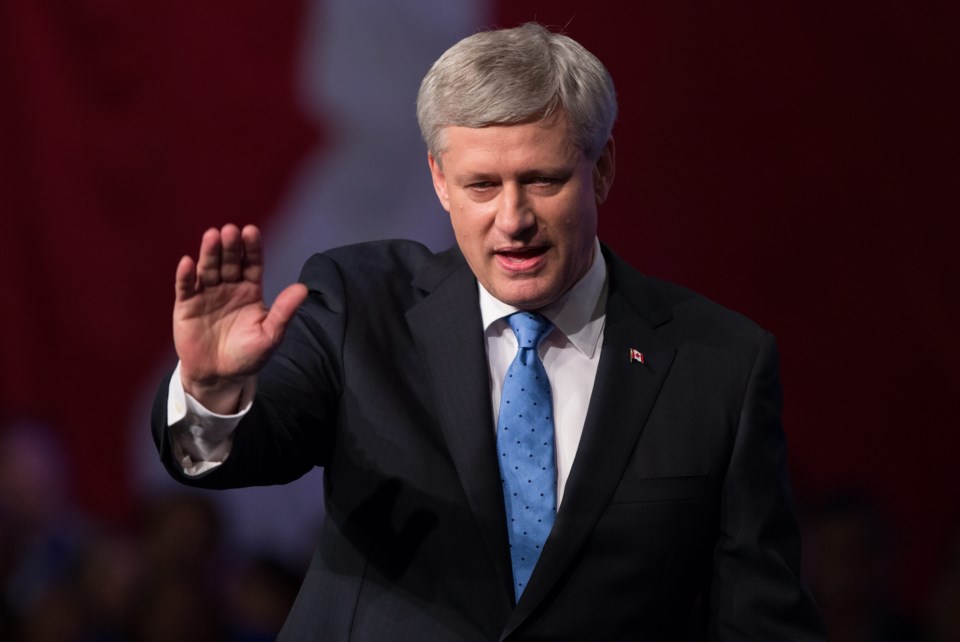Stephen Harper’s tenure as Canada’s sixth-longest serving prime minister came to an abrupt end Monday night as his party was reduced to opposition status and he prepared to step down as its chief.
Harper is staying on as an MP for his own riding of Calgary Heritage, but will now look to his party to reach out to his shrunken parliamentary caucus to request they choose an interim replacement.
“The prime minister indicated that he will continue to sit as a member of Parliament and asks that a process to both select an interim leader and initiate the leadership selection process in our party begin immediately,” Conservative president John Walsh said in a statement.
Oddly, Harper left it up to Walsh to deliver the news he would be stepping down as leader. His concession speech made no mention of it, short of acknowledging responsibility for the night’s resounding defeat.
“While tonight’s results is certainly not the one we had hoped for, the people are never wrong,” an animated, upbeat-looking Harper told supporters in his concession speech.
“The disappointment you also feel is my responsibility and mine alone. But know this for certain: when the next time comes, this party will offer Canadians a strong and clear alternative based on our conservative values.”
Harper’s departure will signal the beginning of a tumultuous time in the party — he has been the only leader of the organization formed in 2003 between the Progressive Conservative and Canadian Alliance parties.
Monday night’s results were being described as a bloodbath by party loyalists who watched in disbelief as cabinet ministers were getting wiped off the electoral map by a surge of Liberal support that also saw the party steal long-held Conservative ridings across Atlantic Canada, Quebec and Ontario.
The Conservatives knew they were facing a tough election when Harper chose to start the clock in August, nearly a month earlier than anticipated. But what the party wasn’t prepared for was a collapse of NDP support that would see the Liberal tide rise and drown Conservative hopes across the country.
And the grousing about what happened and who should shoulder the blame has already begun.
“On every issue, polling shows Canadians are with the government. Two things happened: a bad campaign and Harper fatigue,” said one Conservative source, speaking on the condition of anonymity because they weren’t authorized by the party to comment publicly on the results.
Meanwhile, the so-called “orange wave” created in Quebec and elsewhere in Canada by former NDP leader Jack Layton went down the drain Monday night, taking much of the left-leaning party’s political strength with it.
A visibly deflated Tom Mulcair, who prevailed in a long, difficult fight for his own Quebec riding of Outremont, delivered a subdued but gracious concession speech to a few hundred supporters at Montreal’s Palais de Congres.
“With this election, Canadians have asked us all to work for them. We will not let them down,” said Mulcair, hinting that the party will, at least during a majority Liberal government, resume its role as the conscience of Parliament.
“We will be unwavering in our pursuit of better health care for Canadians. We will stand strong in our fight against climate change and to protect our land, air and water. We will be resolute in our efforts to build a true nation-to-nation relationship with First Nations, Inuit and Metis peoples.
“It’s on these priorities and many more that New Democrats will make real and lasting progress.”
Party insiders said that despite the devastating collapse of the party’s base of support, Mulcair intends to stay on as leader.
The party entered the 78-day campaign riding high in the polls, but saw its lead evaporate halfway through, forcing it to spend the rest of the writ period trying to regain the upper hand.
The momentum shifted for the NDP in mid-September when the Conservatives chose to use the issue of women wearing the niqab at citizenship ceremonies as a wedge issue.
Mulcair was forced to oppose it, a position unpopular among voters in the party’s base of power in Quebec.
It not only blew up the NDP campaign, but it wrecked the Conservatives as well, said Karl Belanger, a senior NDP strategist.
“The Conservatives decided to blow up our campaign with the niqab. So they used that weapon and in the process they blew up their own campaign, so they have only themselves to blame.”
The party placed a lot of emphasis on building a political machine during their time as official Opposition, a fundraising and organizational structure that will survive the dramatic collapse.
“We hoped this investment would bring good results,” said Belanger. “This kind of operation takes a lot of time and resources to build, but once it’s built you can rely on this election and the next election.”



